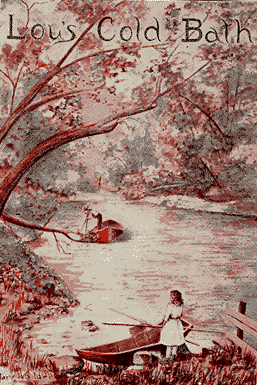Lou's Cold Bath
by Mary Waddell
Dear! I wish Father would come." Lou. Darrows laid her sleeping doll in its bed and lowered its head that the eyes might be completely closed. "I wish you were a real baby," she said. "Dora Baise has a father and mother and little sister; but I haven't anybody but you, Alice' Margaret, Oh, yes, Mr. Tom Yellow Cat, I forgot all about you. Don't claw my dress! You'll tear it! Poor' old fellow! I know you must be hungry -it's dinner time eight now. . . . . I wonder why Father doesn't conic. . .. . . Come on, pussy, I saved a saucer of milk for you this morning, but you weren't here to drink it. Were you out hunting last night? I don't believe you found any 1-mice or you wouldn't be so hungry. , . . . You'll spill 'it! There! Drink your milk. I'm going to see if Father is coming."
For some time Lou amused herself by swinging on the gate while she kept an eye on the path that led to the river. At last she grew inpatient.
"He said he wouldn't be gone but an hour, and it's long past noon, I'm sure. I'm so hungry I could -eat grass like old Bossie. I wish I knew how to cook. I'd get dinner and cat it all tip, so I would. I wonder why he stays so long every time he goes to town. He didn't do that when Motlier was living. He'd hurry right back. He's just a mean old father to leave me alone so long, that's what he is! I just wish he'd- he'd-no I don't either. Maybe something has happened to him. Maybe he's upset-the boat and drowned himself. Oh dear! Oh dear!" Lou shuddered at the thought of it. "I believe I'll go down.to the river where I can see further.
When she reached the edge of the water, her boat was lying at,the landing as usual. Her father had made it and had taught her to row, but, he never permitted her to go out on the water except when he was in his own boat near her. Lou longed in and go up the river to meet him, but she had promised never go alone. Standing quietly by it and gazing up she waited for a long time. At last a small craft appeared and as it drew near she recognized her father.
"Well, what made him do that!" she exclaimed, as lurched and ran out of its course into an old tree that had fallen into the river.
Mr. Darrows stood up and tried to push the boat away Lou noticed that he handled his oars very awkwardly. As she watched him, he suddenly lost his balance and fell into the water. "Oh!" she screamed. "He's lame. He can't swim. He'll drown. I know he will. Father! Father!" wailed the poor little girl as she jumped up and down in distress.
Lou gave way to her feelings for only a moment, however. Quickly jumping into her boat, she rowed up the river as fast as her little arms could work. By the time she reached father, she was almost exhausted. She found him clinging to one of the branches of the old tree.
"Be careful!" Mr. Darrows called. "If you will row around that large limb, I believe you can get the boat close enough for me to get in." After several attempts she finally succeeded and Mr. Darrow rows, with considerable effort, managed to climb in; but in doing so he gave the boat a sudden jerk and Lou tumbled river. How cold the water felt! for it was a cool day in late spring.
"'You can't swim, Father," she called. "Don't jump out. I'll try to-" Just then she sank from sight. Mr. Darrows was about to leap into the water when a voice called:
"Don't jump out, Darrows. I'll get her."'
Looking around. he saw young Dr. Glynn swimming toward Lou, who had come to the surface again. The doctor soon caught her and put her in the boat. Climbing in himself, they rowed to the landing and hurried to the house.
"It's lucky I happened along," said Dr. Glynn, as he put little Lou to bed. "About one minute longer it would have been too late. How did you happen to get into the water yourself, Mr. Darrows?"
"I will tell you the truth, Dr. Glynn. The bootleggers around here have been tempting me with whisky. I hadn't been drinking since we've had Prohibition till they got me at it again. I went to town early this morning, intending to come right back; but Lafe Newman asked me if I didn't want a drink. I didn't take enough to make me drunk, but it made me feel like talking; so I stayed around till noon when I ought to have been at home with Lou, and attending to my work. When I got into the boat, my mind didn't work very well and my nerves were unsteady. I wasn't able to control my hands as usual. I -"
"I understand," replied Dr. Glynn. "Alcohol in whisky is a poison that interferes with the work of the brain. When our brains tell our hands to do,things, they mus. be in good condition or they will tell our hands the wrong thing to do. Your brain is like the engine of your car. If you want your car to run well, you must not injure your engine."
"Dr. Glynn, if it had not been for you my little girl would have drowned because I drank and could not control my movements very well. Drink has made me neglect my child and almost caused her death. Now I am going to take care of my brain. I will cause no more accidents by clouding it with poison. I will never drink another drop."
"Good!" exclaimed Dr. Glynn. "Now I know this little girl will be safer and happier than she has been."
Just then Lou opened her eyes and smiled. Her father stooped and kissed her.
"I just took a cold bath, Father, but I'm glad I did," she said. "I'll not be so lonely and hungry any more, and you'll not poison your brain again, will you, Father?"
"No, dear. Never, never!"
---
Published by the Lincoln-Lee Legion, Westerville Ohio
Copyright, 1922. The American Issue Publishing Co.
About the League
Museum Hours
Monday-Saturday: 9am-6pm
Closed on Saturday: 1-2pm
Closed on Sunday









